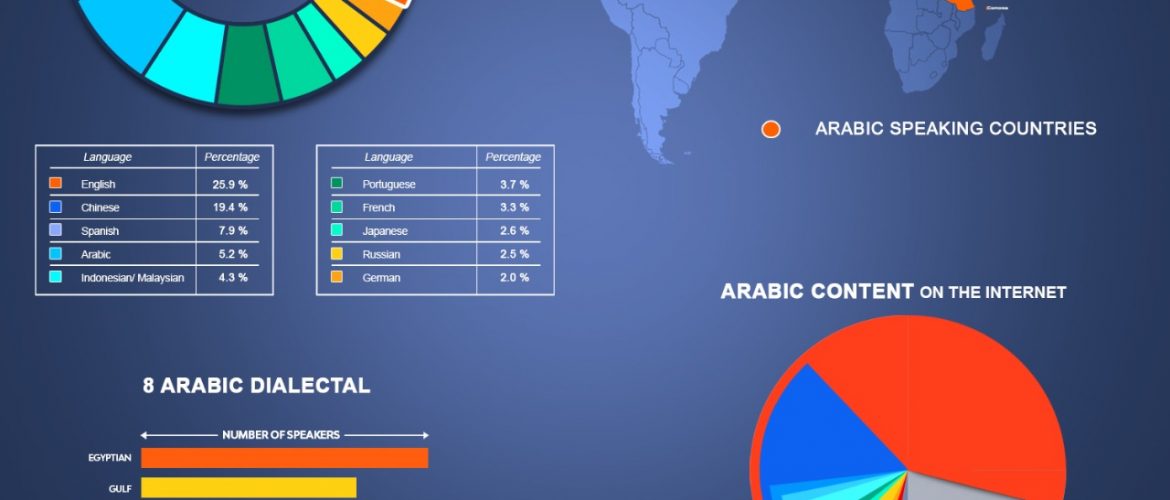Category: History Written by: Daqeeq Date: 10 Mar 2021
Daqeeq says….
Arabic language among other languages
Origin of Arabic language
The Arabic language has become the language of the Quran and Islam 14 hundred years.It is believed that it has originated in the Arabian Peninsula.
“Quraish of Mecca are said to be the first to speak Arabic ‘Fos ha’, and so the Quran today is that of the dialect or style of reading that Prophet Mohammed used himself,” says Hasan Al Naboodah, an Emirati historian and dean of the College of Humanities and Social Sciences at the UAE University in Al Ain.
Arabic started spreading with Islam in the 7th century, changing the native languages of countries in the Middle East and North Africawhile reaching as far as China in the east and Spain in the west.
Arabic speaking countries (MSA and dialects)
Nowadays Arabic is spoken as an official or co-official language in the following countries:
Algeria, Bahrain, Chad, Comoros, Djibouti, Egypt, Eritrea, Iraq, Jordan, Kuwait, Lebanon, Libya, Mauritania, Morocco, Oman, Palestine, Qatar, Saudi Arabia, Somalia, Sudan, Syria, Tanzania, Tunisia, United Arab Emirates and Yemen.
And over 400 million speak it natively, making it the fifth language behind Mandarin, Spanish, English and Hindi.
Modern Arabic is in fact two languages: Modern standard Arabic (MSA) which is used in situations where formality is required (National TVs, News channels, government related documents, etc.) and colloquial Arabic, which differs according to the geographical area.
MSA is understood throughout the whole Arab world and is the language that’s taught in schools and to foreigners interested in learning Arabic.
There are 8 Arabic dialectal groups distributed as shown in the table below:
Dialect |
Areas spoken |
Number of speakers |
Egyptian |
Egypt |
64,500,000 |
Gulf |
Bahrain, Kuwait, Oman, Qatar, Saudi Arabia, UAE |
36,560,000 |
Hassaniya |
Mauritania, southern Morocco, south western Algeria |
8,842,800 |
Levantine |
Lebanon, Jordan, Palestine, Syria |
36,188,500 |
Maghrebi |
Algeria, Libya, Morocco, Tunisia |
32,608,700 |
Mesopotamian / Iraqi |
Iraq, eastern Syria |
15,655,900 |
Sudanese |
Sudan, Southern Egypt |
31,940,300 |
Yemeni |
Yemen, Somalia, Djibouti, southern Saudi Arabia |
14,360,000 |
Source: Arabic Speaking Countries List – 2020 Upate | IstiZada
You won’t find anyone speaking MSA in the streets of an Arabic country but everyone will understand you if you speak it.
Arabic and the Internet
InternetWorldStats estimates of the number of Internet users by language as of March 31, 2020 as follows:
Rank |
Language |
Internet
|
Percentage |
1 |
English |
1,186,451,052 |
25.9% |
2 |
Chinese |
888,453,068 |
19.4% |
3 |
Spanish |
363,684,593 |
7.9% |
4 |
Arabic |
237,418,349 |
5.2% |
5 |
Indonesian / Malaysian |
198,029,815 |
4.3% |
6 |
Portuguese |
171,750,818 |
3.7% |
7 |
French |
151,733,611 |
3.3% |
8 |
Japanese |
118,626,672 |
2.6% |
9 |
Russian |
116,353,942 |
2.5% |
10 |
German |
92,525,427 |
2.0% |
1-10 |
Top 10 languages |
3,525,027,347 |
76.9% |
– |
Others |
1,060,551,371 |
23.1% |
Despite being 4th in the above table, Arabic content on the web accounted for 1.1% putting it in the 12th place in the table provided by W3Techs estimating percentages of the top 10 million websites on the World Wide Web using various content languages as of January 31, 2021:
Rank |
Language |
Percentage |
1 |
English |
60.5% |
2 |
Russian |
8.5% |
3 |
Spanish |
3.9% |
4 |
Turkish |
3.8% |
5 |
Persian |
3.2% |
6 |
French |
2.7% |
7 |
German |
2.3% |
8 |
Japanese |
2.1% |
9 |
Vietnamese |
1.7% |
10 |
Chinese |
1.4% |
11 |
Portuguese |
1.1% |
12 |
Arabic |
1.1% |
13 |
Italian |
0.8% |
14 |
Indonesian |
0.7% |
But the future looks bright. With the rise of lingual and translation companies in the Arab world, it is believed that the numbers of Arabic language status on the Internet will change soon. Here at Daqeeq we’re working towards that by building our own blog with articles published in both Arabic and English. If you’re looking to translate your articles to either Arabic or English don’t hesitate to reach out to us.
The importance of Arabic











No comments yet.